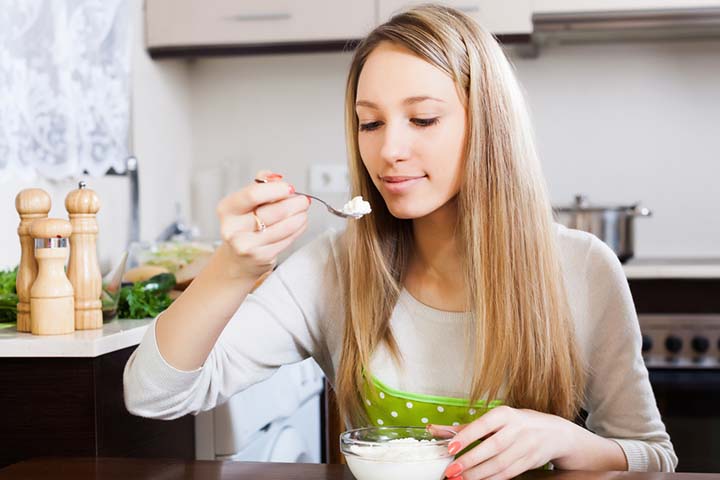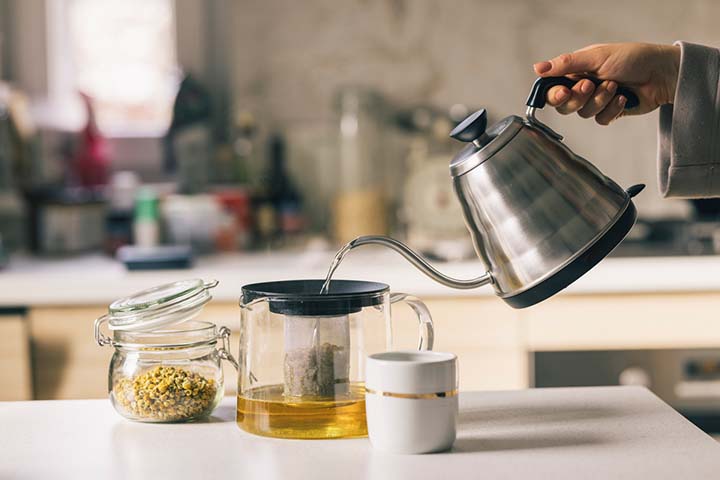Diarrhea while breastfeeding could develop in a few new mothers due to underlying conditions such as acute gastroenteritisiXinflammation of the lining of the stomach and the intestines. or other causes. Although this is not a serious illness requiring cessationiXEnding a condition. of breastfeeding, if you have diarrhea, you must maintain proper hygiene to prevent any risks of transferring any illnesses to your newborn. In addition, ensure proper hydration for maintaining a sufficient milk supply and preventing dehydration due to diarrhea.
Mild diarrhea is usually resolved with the help of natural home remedies. However, it is best to seek a doctor’s advice for severe, long-lasting diarrhea while breastfeeding. Browse through this post to learn more about the common causes, signs, remedies, and treatment options for diarrhea in breastfeeding mothers.
Common Causes Of Diarrhea When Breastfeeding
Various infectious and noninfectious acute and chronic conditions can cause diarrhea. Breastfeeding women can also develop diarrhea from similar causes as others. Common causes of acute diarrhea may include the following (1).
- Viral gastroenteritis (stomach bug)
- Food allergies
- Bacterial gastroenteritis
- Certain medications such as antibiotics
- Parasitic diarrhea
- Lactose intolerance causes diarrhea after consuming dairy products
- Artificial sweeteners, such as sorbitol, found in sugar-free chewing gums and candies
Gastrointestinal disorders can also cause chronic diarrhea.
- Celiac diseaseiXAn autoimmune disorder that results in a reaction to gluten, a protein present in wheat, rye, and other grains.
- Irritable bowel syndromeiXAn intestinal disorder that has multiple symptoms such as abdominal cramping, pain, bloating, and gassiness, among others.
- Microscopic colitisiXAn intestinal inflammation that causes watery diarrhea.
- Inflammatory bowel diseases such as ulcerative colitisiXUlcerative colitis and Crohn’s diseaseiXAn inflammation of the digestive tract that causes swelling of the tissues and leads to abdominal pain, diarrhea, weakness, and malnutrition.
- Pancreatic insufficiencyiXProper functioning of the pancreas ensuring digestion and absorption of essential nutrients. (steatorrhea) diarrhea with high amounts of fat in feces
Conditions causing chronic diarrhea should be evaluated and treated by a specialist. OTC medications and natural remedies may not cure it. Breastfeeding women may also seek medical care if they develop any other symptoms such as fever, chills, abdominal pain, weight loss, or dehydration.
Washington-based board-certified lactation consultant, Lilly Hubschman-Shahar says, “If diarrhea is caused by certain medications, radiopharmaceuticals, or any of the conditions for which the CDC states breastfeeding is contraindicated, then the parent should refrain from breastfeeding. These conditions include HIV (in the absence of a suppressed viral load), Human T-cell Lymphotropic Virus 1&2, illicit drug use, Ebola virus, brucellosis, HSV, or monkeypox.”
Natural Diarrhea Treatments For Breastfeeding Moms
Diarrhea with fever or blood in loose stools needs medical care since it can be due to parasitic or bacterial infections. Mothers with diarrhea lasting more than two days should also see a doctor.
Non-severe diarrhea can be managed with home remedies. You may try the following natural remedies for non-complicated diarrhea while breastfeeding (2).
1. Stay hydrated
To maintain hydration and avoid dehydration it is important to drink plenty of clear fluids. Diarrhea causes fluid loss from the body, and nursing mothers are more likely to develop dehydration since water is also taken from the body for milk production. You may consume more water than other days during diarrhea. You may also take an oral rehydration solution (ORS) as per doctors’ recommendations to cope with fluid and electrolyte loss.
You may drink diluted juices and broths other than water. Caffeinated and alcoholic beverages should be avoided since they may worsen diarrhea.
2. Eat probiotics
Probiotics products contain special microorganisms, such as yeast or bacteria. Lactobacilli or lactic acid bacterium is a well-known probiotic found in yogurt and other dairy products.
Probiotics are often recommended for people with mild diarrhea. It is believed that probiotics reach the bowel and suppress the germs that cause diarrhea and help the body recover (3).
Dairy products, such as milk, may worsen diarrhea in most people. Yogurt and kefir (fermented milk drink) is often suggested during diarrhea. However, you may avoid adding too much sugar to probiotics since sugar may worsen diarrhea.
There are also non-dairy probiotic foods and drinks, including non-dairy yogurts and kefirs, apple cider vinegar, and various krauts.
3. Drink chamomile tea
Chamomile tea is known to reduce diarrhea. Drinking a mug of chamomile tea can be beneficial. This Mediterranean herb is known for its calming effect on the body, including the gastrointestinal system (4).
4. Drink red raspberry leaf tea
Red raspberry leaf tea is a gentle and nutritious tea that acts as a mild astringentiXChemical compounds that shink body tissues. to help dry up the diarrhea and tone the body. It’s safe to drink in moderate amounts up to three cups per day when pregnant or nursing.
5. Take apple cider vinegar
Apple cider vinegar may help to improve the condition of an upset stomach. You may dilute one tablespoon of apple cider vinegar in water and consume it.
6. Avoid certain foods
Maternal diet can also play a role in reducing the incidence of diarrhea. Keeping your fluid intake high and avoiding high fat, high protein, and high fiber food could reduce diarrhea and other digestive issues. You may avoid the following foods during stomach upset.
- Dairy products other than probiotics
- Fatty and fried foods
- Raw fruits and vegetables
- Spices
- Whole grain products
- Sugary foods and drinks
7. Take psyllium husk powder
Psyllium, derived from the plant Plantago ovata, aids in managing mild-to-moderate diarrhea by absorbing water in the digestive system, promoting firmer stool and slowing its passage. Products like Metamucil (fiber supplement) contain psyllium and offer a natural remedy for digestive discomfort (5). While its exposure to the baby through breast milk is believed to be generally low (6), it is advised to consult with a doctor for proper guidance on the duration and quantity of consumption while nursing.
8. Drink ginger tea
Ginger has been a go-to remedy for gastric issues including stomach aches and diarrhea, especially among Asians (7). To make ginger tea, grate a small piece of ginger (about an inch), toss it in a cup of water and let it simmer for ten minutes. After straining it, you may consume it with honey, if desired. However, it is advisable to consult a doctor before incorporating a new home remedy into your breastfeeding routine.
Although known to be beneficial, keep in mind that overconsumption of apple cider vinegar, chamomile tea, ginger tea, and probiotics may cause negative effects, such as vomiting and heartburn. Therefore, do not over consume any natural remedy.
Treatment For Diarrhea When Breastfeeding
The use of over-the-counter loperamide (Imodium) to treat mild diarrhea in breastfeeding mothers is controversial (8). Only minimal amounts reach breast milk since this drug is poorly absorbed from the gut. However, many physicians do not recommend its use while breastfeeding due to its mechanism of action. Loperamide is an opiate receptor agonist similar to the pain medication morphine. It works to slow the transit of stool in the gut. The US Food and Drug Administration warns that large amounts of Imodium can cause heart palpitations.
Diarrhea with fever and blood in stools requires further evaluation and could need prescription medications such as antibiotics. It is not recommended to take prescription medications while breastfeeding unless absolutely necessary since all medications are not lactation-safe. Consult with a physician familiar with the special needs of nursing mothers and their infants, before taking any medication. Remember to have plenty of water and easily digestible food even if you are on medication.
All mothers should consciously maintain hand hygiene and consume hygienically prepared foods to avoid diarrhea while breastfeeding. As diarrhea drains you out of energy, it may make you more tired while breastfeeding. Moreover, if you face acute diarrhea or chronic diarrhea issues, consult a doctor to seek professional medical care for correct diagnosis and management. Also, remember to wash your hands frequently and clean all vegetables bought from grocery stores. It is better to try natural methods of controlling the issue as much as possible.
Key Pointers
- Nursing mothers can develop acute or chronic diarrhea due to several infectious and non-infectious conditions.
- They should seek medical guidance if diarrhea is accompanied by additional symptoms, such as fever, chills, and weight loss.
- Staying hydrated, eating probiotics, and avoiding high-fat, high-fiber food can help manage non-severe diarrhea at home.
- Medicines for diarrhea should be consumed only after consulting an expert.
When breastfed children are shifted to a diet of formula it may take them a while to get used to it. There is no need for concern. Watch this video to understand how your child will react to such a change in diet.















